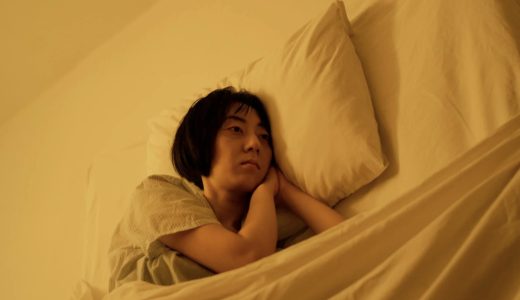Understanding 3 AM wake-ups: What your body may be telling you
By
Veronica E.
- Replies 0
Disclaimer: The information provided in this article is for educational purposes only and is not intended as a substitute for professional medical advice, diagnosis, or treatment. Always consult your physician or other qualified healthcare providers with any questions you may have regarding a medical condition or before making any changes to your health regimen.
If you’ve ever found yourself wide awake in the early morning hours—long before your alarm goes off—you’re not alone.
Many older adults find themselves regularly waking up between 3 and 5 AM, even if they fell asleep without issue.
It might feel frustrating, but these wake-ups could be more than just random disturbances.
Experts say they may offer insight into your body’s stress levels, sleep patterns, and overall health.
Learning what’s behind them could help you sleep more peacefully.

The science of sleep and early wake-ups
Our bodies follow an internal clock known as the circadian rhythm, which helps regulate sleep, hormones, and body temperature across a 24-hour cycle.
One important hormone, cortisol, begins to rise around 2 or 3 AM to help gently prepare us for waking.
But when we’re already under stress, this natural rise in cortisol can push us out of sleep too early—resulting in those familiar 3 AM awakenings.
This phenomenon tends to happen during REM sleep, the stage when the brain is most active.
In REM, we dream, process emotions, and store memories—but it’s also when we’re more likely to wake up and actually remember it.
Also read: Could your sleep habits affect your Alzheimer’s risk? What experts want you to know
Why it happens more often as we age
Sleep architecture changes as we get older.
We often spend less time in deep sleep and more in lighter stages, which can make us more prone to waking.
Hormonal shifts, health conditions, and even certain medications can also play a role.
If you have an inconsistent sleep routine, blood sugar dips at night, or you're going through a major life transition, your body may be more likely to stir awake during the early hours.
Also read: Are you sabotaging your brain at night? Delayed REM sleep linked to higher Alzheimer’s risk
Chronotypes and “social jet lag”
Another factor that may influence your wake-up time is your chronotype—your natural preference for sleeping early or staying up late.
Some people are biologically wired to be morning larks, while others are night owls.
If your lifestyle doesn’t align with your natural rhythms (say, if you’re a night owl forced into an early schedule), your body may push back with fragmented sleep or premature wake-ups.
Also read: Could this creamy fruit help you sleep better? Science says yes
Common causes of 3–5 AM awakenings
If you regularly wake up during these early morning hours, your body could be reacting to:
Also read: Sleep isn’t just about sweet dreams—it’s about everything that comes after
Why “catching up” on sleep doesn’t always help
While sleeping in on weekends might feel like a solution, it may not fully reset your body’s clock.
Studies show it can take several days to recover from even one hour of lost sleep.
What your body craves most is consistency.
Going to bed and waking up at similar times each day—even on weekends—can help stabilize your sleep cycle.
Also read: Is your partner ruining your sleep? Try this simple trick to save your relationship AND your sleep!
What you can do to support better sleep
The good news is there are small, science-backed changes that can make a big difference:
Waking up in the middle of the night isn’t necessarily something to fear—but it can be your body’s way of asking for change.
It might be signaling that you’re stressed, out of routine, or not fully aligned with your natural rhythm.
Rather than ignore the message, try making gentle adjustments and see what helps.
Read next: Get the best sleep of your life tonight with these expert bedtime routine secrets

Many people deal with disrupted sleep at some point in life. If you’ve found ways to fall back asleep—or if you have a calming bedtime habit that helps—you’re not alone, and your experience may help others. We invite you to share your story in the comments below!
If you’ve ever found yourself wide awake in the early morning hours—long before your alarm goes off—you’re not alone.
Many older adults find themselves regularly waking up between 3 and 5 AM, even if they fell asleep without issue.
It might feel frustrating, but these wake-ups could be more than just random disturbances.
Experts say they may offer insight into your body’s stress levels, sleep patterns, and overall health.
Learning what’s behind them could help you sleep more peacefully.

A quiet early morning wake-up can feel frustrating—but it may be your body’s way of signaling stress or a disrupted sleep cycle. Image Source: Pexels / cottonbro studio.
The science of sleep and early wake-ups
Our bodies follow an internal clock known as the circadian rhythm, which helps regulate sleep, hormones, and body temperature across a 24-hour cycle.
One important hormone, cortisol, begins to rise around 2 or 3 AM to help gently prepare us for waking.
But when we’re already under stress, this natural rise in cortisol can push us out of sleep too early—resulting in those familiar 3 AM awakenings.
This phenomenon tends to happen during REM sleep, the stage when the brain is most active.
In REM, we dream, process emotions, and store memories—but it’s also when we’re more likely to wake up and actually remember it.
Also read: Could your sleep habits affect your Alzheimer’s risk? What experts want you to know
Why it happens more often as we age
Sleep architecture changes as we get older.
We often spend less time in deep sleep and more in lighter stages, which can make us more prone to waking.
Hormonal shifts, health conditions, and even certain medications can also play a role.
If you have an inconsistent sleep routine, blood sugar dips at night, or you're going through a major life transition, your body may be more likely to stir awake during the early hours.
Also read: Are you sabotaging your brain at night? Delayed REM sleep linked to higher Alzheimer’s risk
Chronotypes and “social jet lag”
Another factor that may influence your wake-up time is your chronotype—your natural preference for sleeping early or staying up late.
Some people are biologically wired to be morning larks, while others are night owls.
If your lifestyle doesn’t align with your natural rhythms (say, if you’re a night owl forced into an early schedule), your body may push back with fragmented sleep or premature wake-ups.
Also read: Could this creamy fruit help you sleep better? Science says yes
Common causes of 3–5 AM awakenings
If you regularly wake up during these early morning hours, your body could be reacting to:
- Stress and anxiety, which keep cortisol levels elevated at night
- Sleep debt, which disrupts normal sleep stages
- Blood sugar fluctuations, especially after late-night snacking or missed meals
- Hormonal changes, like those experienced during menopause
- Circadian rhythm disruptions, from travel, shift work, or irregular bedtimes
Also read: Sleep isn’t just about sweet dreams—it’s about everything that comes after
Why “catching up” on sleep doesn’t always help
While sleeping in on weekends might feel like a solution, it may not fully reset your body’s clock.
Studies show it can take several days to recover from even one hour of lost sleep.
What your body craves most is consistency.
Going to bed and waking up at similar times each day—even on weekends—can help stabilize your sleep cycle.
Also read: Is your partner ruining your sleep? Try this simple trick to save your relationship AND your sleep!
What you can do to support better sleep
The good news is there are small, science-backed changes that can make a big difference:
- Get morning sunlight: Aim for natural light within 30 minutes of waking. In the evening, dim lights a few hours before bed to help your body wind down.
- Stick to a routine: Your circadian rhythm thrives on regularity. Try to go to sleep and wake up at the same time every day.
- Move during the day: Physical activity, especially in the morning or early afternoon, helps reduce stress and regulate sleep hormones.
- Create a sleep-friendly environment: Keep your bedroom cool, quiet, and dark. A warm shower before bed can help trigger the drop in body temperature needed for sleep.
- Watch food and drink: Avoid caffeine, heavy meals, and alcohol late in the day. Aim for balanced meals that help regulate blood sugar.
Waking up in the middle of the night isn’t necessarily something to fear—but it can be your body’s way of asking for change.
It might be signaling that you’re stressed, out of routine, or not fully aligned with your natural rhythm.
Rather than ignore the message, try making gentle adjustments and see what helps.
Read next: Get the best sleep of your life tonight with these expert bedtime routine secrets
Key Takeaways
- Waking up between 3 and 5 AM may be linked to stress, hormone changes, and natural shifts in your sleep cycle.
- These wake-ups often happen during REM sleep, when your brain is more alert and emotions are being processed.
- Factors like blood sugar dips, irregular routines, and misaligned chronotypes can make early wake-ups more likely.
- Strategies like getting morning sunlight, managing stress, and keeping a consistent bedtime can improve sleep quality.
Many people deal with disrupted sleep at some point in life. If you’ve found ways to fall back asleep—or if you have a calming bedtime habit that helps—you’re not alone, and your experience may help others. We invite you to share your story in the comments below!






